Inclement weather is creating delays for Canadian defence scientists trying to test surveillance devices in the High Arctic this week.
A 10-person team with National Defence is on Devon Island, trying to install land-based sensors there and underwater listening devices stretching out into Barrow Strait, as part of its four-year Northern Watch pilot research project.
But winds gusting up to 90 km/h in the area are hampering the research team's efforts to install the devices, which requires use of a helicopter, Twin Otter airplanes and all-terrain vehicles.
"We've been successful at setting up the basic camp, but now we're on standby and waiting for better weather conditions," Roger Dao, the Northern Watch project manager with Defence Research and Development Canada, told CBC News on Thursday.
"It's been a challenge. People need to bend over because the winds are really moving, pushing them around," he added with a laugh.
The Northern Watch project is aimed at boosting Canada's ability to keep an eye on ships and submarines passing through the eastern entrance to the Northwest Passage.
Dao said his team has installed the satellite link, so they have communications from the base.
The coast guard ship Terry Fox is waiting for the weather to clear so it can help the researchers install an underwater cable out into Barrow Strait.
The team is supposed to be in the High Arctic for two weeks, but Dao said they may extend their stay and try to get more work done.
Keeping an eye for 'rogue' vessels
Grise Fiord resident and Arctic sovereignty watcher Larry Audlaluk said he's glad Canada is moving ahead with the Northern Watch project, especially given all the cruise ships and other vessels coming into the North.
"I think it's a very good idea, keeping an eye on who's coming, what foreigners are coming, and to keep an eye on any rogue ships or submarines that are not friendly, as they say, in military terms," Audlaluk said.
Still, Audlaluk added that the federal government should give northerners more information about their efforts, so residents know what's going on.
National Defence says it plans to get the Canadian Rangers involved with the project, as well as hire locals for jobs at the base camp.
Dao said the lessons they learn this summer will be useful for the next three years of the Northern Watch project.
WEATHER NOTE
Regional Hurricane Shelter Step Closer
Published: June 24, 2008
NEW PORT RICHEY - NEW PORT RICHEY - Plans are moving forward for a regional hurricane shelter and health care clinic in Hudson.
The county commission at a meeting today in New Port Richey awarded a $7.5 million contract to Spring Engineering and Bandes Construction to design and build the facility off Denton Avenue. The project is being funded with state and federal grants.
According to the terms of the agreement, the shelter must comply with the latest federal standards, to withstand winds up to 200 miles per hour and the pressures of an F5 tornado.
The Federal Emergency Management Agency has, however, exempted the facility from the more stringent rules, Assistant County Attorney Jane Fagan said, and the cost of construction may decrease in light of the exemption.
The shelter still must withstand 190 mph winds, but the exemption will allow for significant savings, county officials have said.
An additional $750,000 has been allocated to convert the shelter into a clinic for uninsured and underinsured residents.
Also Tuesday, the West Pasco Chamber of Commerce asked the board to renew its sponsorship of Business Development Week in January.
In the past, the county has been a major sponsor, contributing $15,000 to the weeklong event.
Commissioners delayed consideration of the item until next month, when they begin the arduous process of cutting some $22 million from the $1.2 billion county budget. The cuts are needed to compensate for a constitutional amendment allowing bigger property tax breaks for homeowners and to make up for reductions in state funding.
Chamber President Joe Alpine said his organization understands the county's financial constraints and hopes for some kind of contribution. This past January, more than 1,000 people participated in Business Development Week.
"We do know it's hard economic times right now," Alpine said. "No matter what the decision is, we intend to move forward with our workshops. It's very important for businesses to get good skills and experience they need to operate efficiently. Much hinges on the success of businesses."
Commissioner Jack Mariano suggested the chamber look to outside funding sources in case the county commission can't contribute.
Commission Chairman Ted Schrader asked if there were other levels of sponsorship.
Alpine said the county could contribute $7,500 and still be a leading sponsor.
My good friend at Freague Waves has a excellent article on the KAZ II
Sunday, August 10, 2008
The case of Yacht Kaz II
I blogged about the case of yacht Kaz II as part of a post entitled "Peril of yachting in the South Ocean" last year. Kaz II has been branded as a ghost ship ever since she was found on April 18, 2007 while drifting with engine running but no crew on board. TimesOnline reported a week later that pthe three men crew "were most like washed overboard in a violent squall or freak wave according to police" among other possible explanations.
Well, there was a "coronial' inquiry being conducted last week and this morning the Guardian reported the coroner's ruling. First a recap of the case:
The trio, described as "typical Aussie blokes", vanished after setting sail on April 15 last year on a planned two-month trip, bound for Western Australia where they all lived. Three days later, the white-painted vessel which Mr Batten had only recently bought for £60,000 was found adrift and with a ripped sail about 100 miles north-east of Townsville, near the Whitsunday islands.
The engine was idling, a half-empty cup of coffee and a laptop computer were sitting on a table, a newspaper was lying open with some pages strewn on the floor and clothing had been piled on a bench.
The men went to sea with a large supply of food, three cases of beer, a .44 calibre rifle and 100 rounds of ammunition, the inquest was told.
Now the finding:
Coroner Michael Barnes said evidence put before him during a four day inquest led him to conclude that "an unfortunate series of events," befell the trio, who were all relatively inexperienced sailors, only a few hours after they set sail.
In the scenario he laid out, the coroner said one of the brothers attempted to free a fishing line that had become wrapped around the yacht's propeller when he fell overboard. The other brother fell in while trying to rescue him.
Mr Batten tried to drop the sails so he could turn around and go back for his two friends but a change in the wind's direction caused the yacht's boom to swing and knock him overboard.
"Once the three men were in the water there was very little chance they could get back on the boat," he said. "It would be beyond their reach in seconds. From that point, the end would have been swift.
"None of them was a good swimmer, the seas were choppy, they would have quickly become exhausted and sunk beneath the waves. Although I can't exclude the possibility of a shark attacking them, drowning is a far more likely cause of death."
which is a very plausible scenario. I am impressed. I guess an important piece of evidence which might not have made public before was shown to the court, in which the skipper, Des Batten, was holding the camera and
Jim Tunstead can be seen fishing while he and Mr Batten are heard mocking Peter Tunstead, a non-swimmer, who was sitting fishing at the back with the safety rail down. He was not wearing a lifejacket. In the film, the men talk about "threatening skies" ahead.
That seems to be a logical scene that led to the scenario the coroner concluded. They were not good swimmers and they did not bother to wear their lifejacket should also be an important lesson for everyone to learn here.
The seas were choppy, we can not preclude the possible occurrence of a freaque wave. But whether or not a freaque wave occurred, it will not alter in any way the scenario the coroner so brilliantly laid out.
They still have not been able to find their bodies. But at least their yacht, the Kaz II, is no longer a ghost boat.
RS









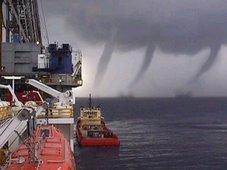
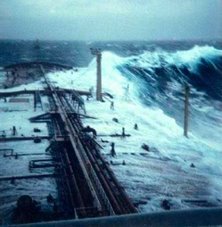
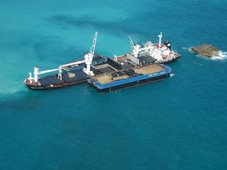
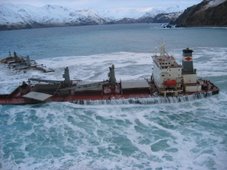
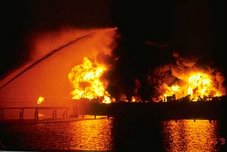
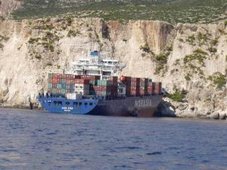
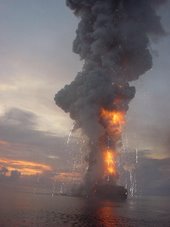

![Validate my RSS feed [Valid RSS]](valid-rss.png)
No comments:
Post a Comment